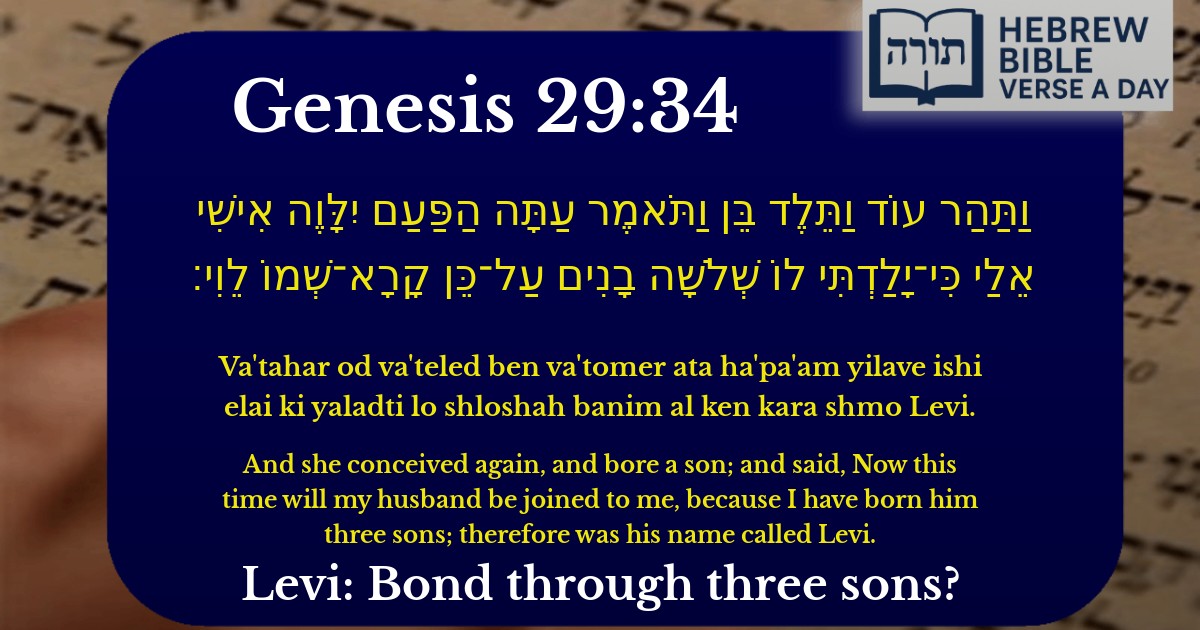Join Our Newsletter To Be Informed When New Videos Are Posted
Join the thousands of fellow Studends who rely on our videos to learn how to read the bible in Hebrew for free!
Hebrew Text
וַתַּהַר עוֹד וַתֵּלֶד בֵּן וַתֹּאמֶר עַתָּה הַפַּעַם יִלָּוֶה אִישִׁי אֵלַי כִּי־יָלַדְתִּי לוֹ שְׁלֹשָׁה בָנִים עַל־כֵּן קָרָא־שְׁמוֹ לֵוִי׃
English Translation
And she conceived again, and bore a son; and said, Now this time will my husband be joined to me, because I have born him three sons; therefore was his name called Levi.
Transliteration
Va'tahar od va'teled ben va'tomer ata ha'pa'am yilave ishi elai ki yaladti lo shloshah banim al ken kara shmo Levi.
Hebrew Leining Text
וַתַּ֣הַר עוֹד֮ וַתֵּ֣לֶד בֵּן֒ וַתֹּ֗אמֶר עַתָּ֤ה הַפַּ֙עַם֙ יִלָּוֶ֤ה אִישִׁי֙ אֵלַ֔י כִּֽי־יָלַ֥דְתִּי ל֖וֹ שְׁלֹשָׁ֣ה בָנִ֑ים עַל־כֵּ֥ן קָרָֽא־שְׁמ֖וֹ לֵוִֽי׃
וַתַּ֣הַר עוֹד֮ וַתֵּ֣לֶד בֵּן֒ וַתֹּ֗אמֶר עַתָּ֤ה הַפַּ֙עַם֙ יִלָּוֶ֤ה אִישִׁי֙ אֵלַ֔י כִּֽי־יָלַ֥דְתִּי ל֖וֹ שְׁלֹשָׁ֣ה בָנִ֑ים עַל־כֵּ֥ן קָרָֽא־שְׁמ֖וֹ לֵוִֽי׃
🎵 Listen to leining
Parasha Commentary
📚 Talmud Citations
This verse is quoted in the Talmud.
📖 Berakhot 7b
The verse is referenced in a discussion about the names of the tribes and their significance, particularly focusing on the naming of Levi and its implications.
📖 Sotah 12a
The verse is cited in the context of discussing the birth of the tribes of Israel and the meanings behind their names, with a focus on Leah's statements.


Leah's Naming of Levi
The verse (Bereshit 29:34) describes Leah naming her third son Levi, expressing her hope that her husband Yaakov would now be more closely attached (yilaveh) to her after bearing three sons. This reflects Leah's ongoing desire for a deeper marital connection with Yaakov.
Etymology of the Name Levi
Rashi explains that Leah chose the name Levi (לֵוִי) based on her statement "yilaveh ishi elai" (my husband will be joined to me), deriving from the root ל.ו.ה meaning "to accompany" or "to attach." The name signifies her hope for greater closeness in her marriage.
Significance of Three Sons
The Midrash (Bereshit Rabbah 71:4) notes that Leah referenced having three sons because three represents a complete unit in Jewish thought - just as Avraham's covenant was established after three tests (Pirkei Avot 5:3). By bearing three sons, Leah felt she had established a firm foundation in Yaakov's household.
Levi's Future Role
Ramban suggests this naming foreshadowed Levi's descendants' role as the priestly class who would be "joined" to Hashem's service. The tribe of Levi would later become the spiritual leaders of Israel, dedicated to Divine service in the Mishkan and Beit Hamikdash.
Leah's Spiritual Insight
The Kli Yakar observes that Leah demonstrated prophetic insight in her naming. While she spoke of her husband being joined to her, on a deeper level this alluded to the future Levites who would be "joined" to Hashem (Devarim 10:8-9).